三、英译汉基础翻译要点——名词从句的译法
考研英译汉四类名词从句译法

考研英译汉四类名词从句译法英语名词从句包括主语从句、宾语从句、表语从句和同位语从句等。
翻译时大多数可译成相对应的汉语,但也还有一些其它处理方法。
下面分别加以介绍:一、主语从句1。
以what, whatever, whoever等代词引导的主语从句一般可按原文顺序翻译,例如:What he told me is only half-truth。
他告诉我的只是些半真半假的东西而己2。
以“it”作形式主语的主语从句1) 逻辑主语从句如提前译出,有两种情况:若强调,“it”一般可译出来;如不强调,“it”可不译出来。
It doesn't make much difference whether he attends the meeting or not。
他参不参加会议没有多大关系。
(不强调)It seemed inconceivable that the pilot could have survived the crash。
在飞机坠毁之后,驾驶员竟然还能活着,这看来是不可想象的。
(强调)2) 逻辑主语从句不提前,“it”一般不需译出。
It is suggested that the meeting should be canceled。
有人建议取消会议。
二、宾语从句1。
用that, what, how等引起的宾语从句汉译时一般不须改变顺序。
I told him that because of the last condition,I′d have to turn it down。
我告诉他,由于那最后一个条件,我只得谢绝。
2。
用“it”作形成宾语的句子,that宾语从句可按原文顺序译出,“it”可不译。
I made it clear to them that they must hand in their papers before 10 o′clock in the morning。
我向他们讲清楚了的,他们必须在上午十时前交卷。
翻译培训 名词性从句的译法

宾语从句的译法
在把宾语从句译成汉语时,通常按 照句子的语序翻译即可。
有时也视具体情况对原文语序进行 调整。
例:
They proposed that we take certain precautions.
It +谓语+that从句
通常按原文句子结构顺序翻译,It 不 译出来。
例:
It seems that she is going to buy a car on installment.
她好像要用分期付款的方式购买汽车。
It goes without saying that plants cannot grow without sunlight. 不言而喻,没有阳光,植物就不能生长。
Enthusiasm means that your are stimaulated by your work, and are able to find new challenges and keep growing professionally. But most jobs have some elements that are less fun and more difficult to carry out. This is where passion really comes into play. When you love that you do, it isn’t too difficult to get the job done. The hard part is performing equally well in those less interesting tasks.
英译汉——名词性从句的译法

考研英语每日一课(英译汉——名词性从句的译法)英译汉——名词性从句的译法英语名词性从句包括主语从句,宾语从句, 表语从句和同位语从句, 在翻译这类从句时, 大多数可以按照原文的句序翻译成相应的汉语,但是也有一些具体的处理方法,下面我们结合一些实例加以说明:例1.How andwhenhuman lang uagedevel opedand w hethe r ani malssuchasch impan zeesand g orill as ca n dev elopa mor e ela borat e sys tem o f com munic ation areissue s atprese nt be ing r esear ched, butas ye t lit tle u nders tood.人类的语言是如何发展起来的, 是什么时候形成的, 诸如黑猩猩和大猩猩一类的动物是否会形成一种更加复杂的交流系统,都是现阶段人们研究的课题, 但对此人们都知之甚少。
(主语从句)例2.How w ell t he pr edict ion w ill b e val idate d bylater perf orman ce de pends upon theamoun t, re liabi lity, andappro priat eness of t he in forma tionusedand o n the skil l andwisd om wi th wh ich i t isinter prete d. (95年考题)这些预测能在多大程度上被后来的成绩所证实取决于所使用的信息的量、可靠性和适合程度,并取决于对信息作出解释的技能和智慧。
名词性从句的翻译
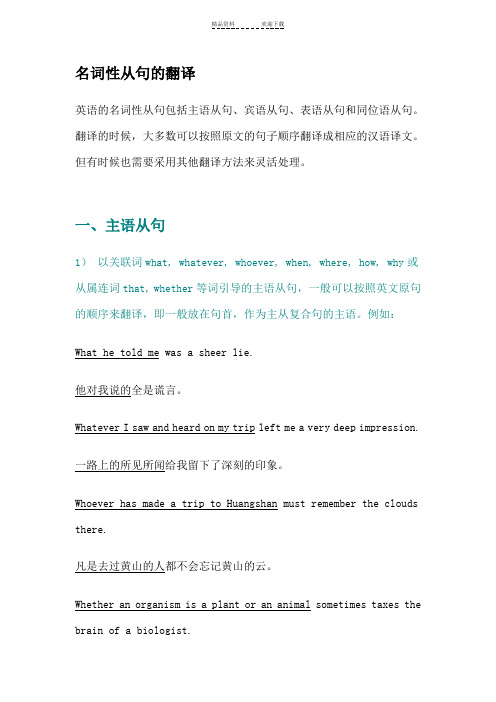
名词性从句的翻译英语的名词性从句包括主语从句、宾语从句、表语从句和同位语从句。
翻译的时候,大多数可以按照原文的句子顺序翻译成相应的汉语译文。
但有时候也需要采用其他翻译方法来灵活处理。
一、主语从句1)以关联词what, whatever, whoever, when, where, how, why或从属连词that, whether等词引导的主语从句,一般可以按照英文原句的顺序来翻译,即一般放在句首,作为主从复合句的主语。
例如:What he told me was a sheer lie.他对我说的全是谎言。
Whatever I saw and heard on my trip left me a very deep impression.一路上的所见所闻给我留下了深刻的印象。
Whoever has made a trip to Huangshan must remember the clouds there.凡是去过黄山的人都不会忘记黄山的云。
Whether an organism is a plant or an animal sometimes taxes the brain of a biologist.一种生物究竟是植物还是动物,有时会让生物学家颇伤脑筋。
2) 对于it作形式主语的主语从句,可以先译主句,顺译为无人称句。
有时也可先译从句,再译主句,这样的话,一般需要在主句前加译“这”。
需要注意的是,如果强调it,可以将其译出;如果不需要强调,也可不译。
例如:It is strange that she should have failed to see her own shortcomings.真奇怪,她竟然看不出自己的缺点。
It seemed incredible that she should have lied to us.她居然对我们说谎,这真是不可思议。
It doesn’t make much difference to me whether you come or not.你来不来我不在乎。
从句的译法
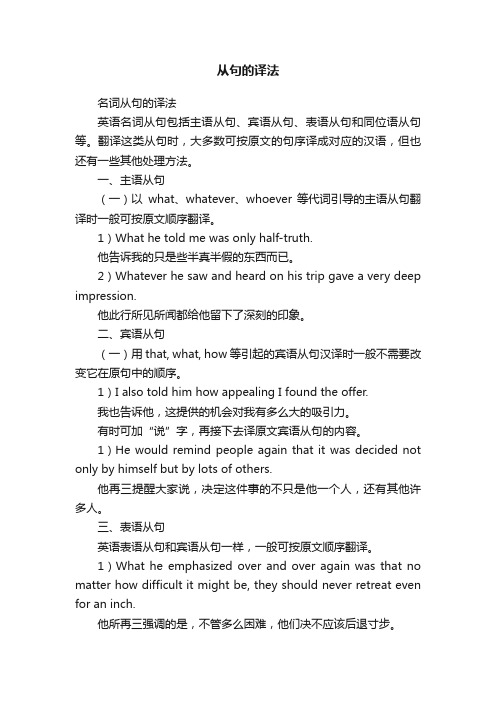
从句的译法名词从句的译法英语名词从句包括主语从句、宾语从句、表语从句和同位语从句等。
翻译这类从句时,大多数可按原文的句序译成对应的汉语,但也还有一些其他处理方法。
一、主语从句(一)以what、whatever、whoever 等代词引导的主语从句翻译时一般可按原文顺序翻译。
1)What he told me was only half-truth.他告诉我的只是些半真半假的东西而已。
2)Whatever he saw and heard on his trip gave a very deep impression.他此行所见所闻都给他留下了深刻的印象。
二、宾语从句(一)用that, what, how 等引起的宾语从句汉译时一般不需要改变它在原句中的顺序。
1)I also told him how appealing I found the offer.我也告诉他,这提供的机会对我有多么大的吸引力。
有时可加“说”字,再接下去译原文宾语从句的内容。
1)He would remind people again that it was decided not only by himself but by lots of others.他再三提醒大家说,决定这件事的不只是他一个人,还有其他许多人。
三、表语从句英语表语从句和宾语从句一样,一般可按原文顺序翻译。
1)What he emphasized over and over again was that no matter how difficult it might be, they should never retreat even for an inch.他所再三强调的是,不管多么困难,他们决不应该后退寸步。
2) That was how a small nation won the victory over a big power.就这样,小国战胜了大国。
从句的译法
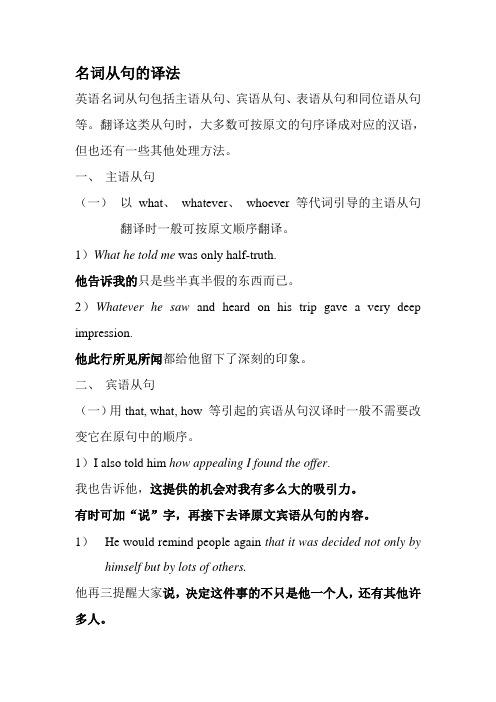
名词从句的译法英语名词从句包括主语从句、宾语从句、表语从句和同位语从句等。
翻译这类从句时,大多数可按原文的句序译成对应的汉语,但也还有一些其他处理方法。
一、主语从句(一)以what、whatever、whoever 等代词引导的主语从句翻译时一般可按原文顺序翻译。
1)What he told me was only half-truth.他告诉我的只是些半真半假的东西而已。
2)Whatever he saw and heard on his trip gave a very deep impression.他此行所见所闻都给他留下了深刻的印象。
二、宾语从句(一)用that, what, how 等引起的宾语从句汉译时一般不需要改变它在原句中的顺序。
1)I also told him how appealing I found the offer.我也告诉他,这提供的机会对我有多么大的吸引力。
有时可加“说”字,再接下去译原文宾语从句的内容。
1)He would remind people again that it was decided not only by himself but by lots of others.他再三提醒大家说,决定这件事的不只是他一个人,还有其他许多人。
三、表语从句英语表语从句和宾语从句一样,一般可按原文顺序翻译。
1)What he emphasized over and over again was that no matter how difficult it might be, they should never retreat even for an inch.他所再三强调的是,不管多么困难,他们决不应该后退寸步。
2) That was how a small nation won the victory over a big power.就这样,小国战胜了大国。
句法翻译3——名词性从句的翻译
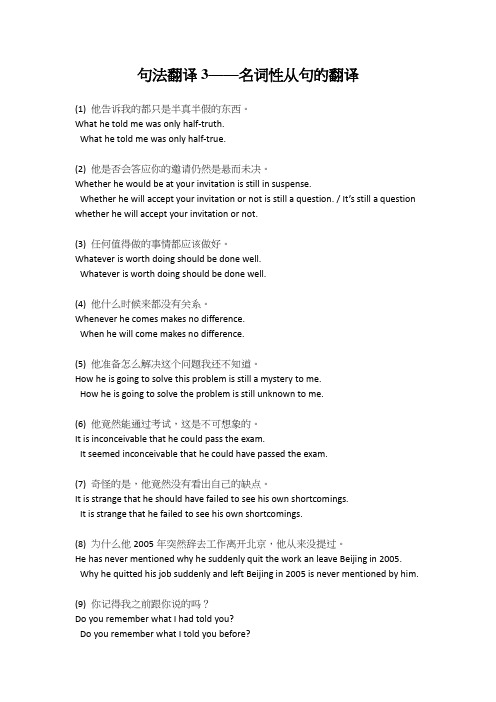
句法翻译3——名词性从句的翻译(1) 他告诉我的都只是半真半假的东西。
What he told me was only half-truth.What he told me was only half-true.(2) 他是否会答应你的邀请仍然是悬而未决。
Whether he would be at your invitation is still in suspense.Whether he will accept your invitation or not is still a question. / It’s still a question whether he will accept your invitation or not.(3) 任何值得做的事情都应该做好。
Whatever is worth doing should be done well.Whatever is worth doing should be done well.(4) 他什么时候来都没有关系。
Whenever he comes makes no difference.When he will come makes no difference.(5) 他准备怎么解决这个问题我还不知道。
How he is going to solve this problem is still a mystery to me.How he is going to solve the problem is still unknown to me.(6) 他竟然能通过考试,这是不可想象的。
It is inconceivable that he could pass the exam.It seemed inconceivable that he could have passed the exam.(7) 奇怪的是,他竟然没有看出自己的缺点。
英译汉翻译方法介绍句子的翻译
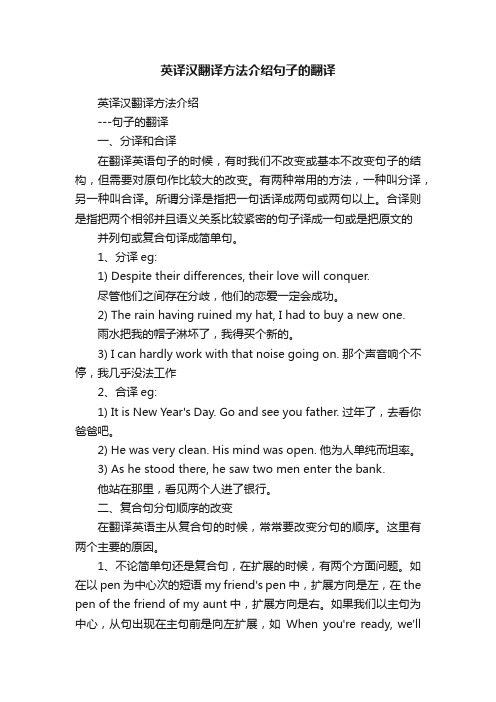
英译汉翻译方法介绍句子的翻译英译汉翻译方法介绍---句子的翻译一、分译和合译在翻译英语句子的时候,有时我们不改变或基本不改变句子的结构,但需要对原句作比较大的改变。
有两种常用的方法,一种叫分译,另一种叫合译。
所谓分译是指把一句话译成两句或两句以上。
合译则是指把两个相邻并且语义关系比较紧密的句子译成一句或是把原文的并列句或复合句译成简单句。
1、分译eg:1) Despite their differences, their love will conquer.尽管他们之间存在分歧,他们的恋爱一定会成功。
2) The rain having ruined my hat, I had to buy a new one.雨水把我的帽子淋坏了,我得买个新的。
3) I can hardly work with that noise going on. 那个声音响个不停,我几乎没法工作2、合译eg:1) It is New Year's Day. Go and see you father. 过年了,去看你爸爸吧。
2) He was very clean. His mind was open. 他为人单纯而坦率。
3) As he stood there, he saw two men enter the bank.他站在那里,看见两个人进了银行。
二、复合句分句顺序的改变在翻译英语主从复合句的时候,常常要改变分句的顺序。
这里有两个主要的原因。
1、不论简单句还是复合句,在扩展的时候,有两个方面问题。
如在以pen为中心次的短语my friend's pen中,扩展方向是左,在the pen of the friend of my aunt中,扩展方向是右。
如果我们以主句为中心,从句出现在主句前是向左扩展,如When you're ready, we'llleavefor Shanghai.如果从句出现在主句之后则是向右扩展,如We'll leave for Shanghai由于这汉语句子的扩展方向倾向于左。
名词性从句的译法
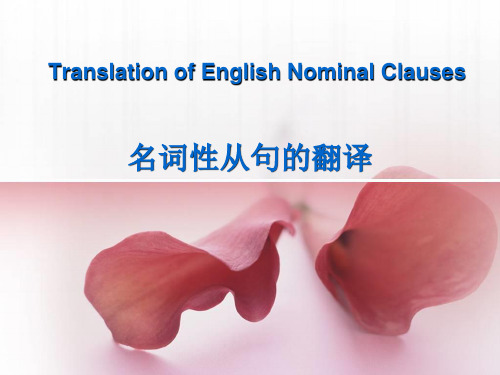
例4:Whatever he saw and heard on his trip gave him a very deep impression. 【译文】他此行所见所闻都给他留下了深刻的印象。 例5:Since hearing her predicament, I’ve always arranged to meet people where they or I can be reached in case of delay. 【译文】听她说了那次尴尬的经历之后,每每与人约 见,我总要安排在彼此能够互相联系的上的地 方,以免误约。
and talk the matter over with him.(it作形式宾
语)
【译文】我理所当然地认为,你会来跟他谈这件事
的。
例3:Another cause of obscurity is that the writer is himself not quite sure of his meaning. (表语从句) 【译文】写不清楚还有一个原因,那就是作者自 己对于所要表达的意思也不是很有把握。
补充例句:名词性从句 例6.We can explain very simply the important differences between solids, liquids, and gases on the basis of the theory that matter is made up of particles, and that these particles can move more easily in some states of matter than in others. (同位语
这些从句的翻译一般按原句的语序处理这些从句的翻译一般按原句的语序处理即可相对比较容易但有时也可以译即可相对比较容易但有时也可以译为并列分句定语从句或其它形式的句为并列分句定语从句或其它形式的句如果名词性从句包含两层以上的意思需要把主句与从句分开译
名词性从句的译法

目 录
• 名词性从句的概述 • 名词性从句的翻译技巧 • 名词性从句在句子中的位置和功能 • 名词性从句的特殊译法 • 名词性从句在汉译英中的应用
01
名词性从句的概述
定义与分类
定义
名词性从句是句子在复合句中充当名 词成分,包括主语、宾语、表语和同 位语等。
分类
根据功能和意义,名词性从句可以分 为陈述性从句、疑问性从句和祈使性 从句。
主语从句
主语从句在句子中充当主语,表达句子 的核心信息。
在翻译时,通常将主语从句放在句首,以突 出其重要性。
例如:When he comes back is unknown. 他什么时候回来还不知 道。(主语从句翻译为“什么时候 他回来还不知道”)
宾语从句
01
宾语从句在句子中充当宾语,对句子的主语进行补 充说明。
详细描述
合句法是指将多个简单句合并成一个长句,使译文更加 紧凑、连贯。这种方法通常用于翻译多个简单句构成的 长句,如“She is beautiful, and that is why he likes her.”可合句译为“她很漂亮,这就是他喜欢她的原因。 ”
03
名词性从句在句子中的 位置和功能
要点二
详细描述
分句法是指将复杂的名词性从句拆分成多个简单句,使译 文更加清晰、易于理解。这种方法通常用于翻译包含多个 从句或修饰语的名词性从句,如“What I like is the way she talks.”可分句译为“我喜欢的是她说话的方式。”
合句法
总结词
将多个简单句合并成一个长句,增强整体感。
在翻译过程中,要保持原文的语义完整性和通顺度,避免出现歧义和语病。同时,要注意符合目标语 言的表达习惯和规范。
名词从句的译法

谢绝。 谢绝。
2)A principle of science tell us what ) usually happens under certain conditions. 科学原理告诉我们在一定条件下所会
发生的事。 发生的事。
3)I also told him how appealing I ) found the offer. 我也告诉他, 我也告诉他,这提供的机会对我有多
名词性从句的其他处理方法
一、主语从句
(一)以what, whatever, whoever等 等 代词引导的主语从句翻译时一般可按 原文顺序翻译。 原文顺序翻译。 1)What he told me was only half) truth. 只是些半真半假的东西而已。 他告诉我的只是些半真半假的东西而已。
(三)原文中有些同位语,汉译时往 原文中有些同位语, 往需要作适合扩充或破折号、冒号等。 往需要作适合扩充或破折号、冒号等。 1)Her son, my employer’s nephew, ) was himself an assistant in the shop. 她的儿子, 她的儿子,也就是我老板的侄子,也 在店里当伙计。 在店里当伙计。
苏联已把它的舰队派往世界各地,
这是事实。 这是事实。
2.真正主语不提前,it一般不需要 真正主语不提前, 一般不需要 真正主语不提前 译出来。 译出来。 1) It is strange that she should ) have failed to see her own shortcomings. 真奇怪, 真奇怪,她竟然没有看出自己的
第五章
第三节、 第三节、
名词从句的译法
名词从句的译法
• 英语名词从句包括主语从句、 英语名词从句包括主语从句、 宾语从句、 宾语从句、表语从句和同位语 从句。翻译这类从句时, 从句。翻译这类从句时,大多 数可以按原文的句序译成对应 的汉语, 的汉语,如:
2012年考研《英语》三大从句翻译方法解读

考研英语三大从句翻译方法解读考研翻译应对策略应对策略:两个关键。
一、理解的关键在于理解英语的语法结构、逻辑结构。
二、表达的关键在于根据汉语习惯对于译入语进行适当调整。
考生们在复习的时候需要注意的是以下几点:(1) 能直译不意译。
直译不符合汉语习惯的时候,要意译。
另外,还有一些有固定翻译方法的语法结构和搭配也要遵循惯用意译方法。
例如:IT is well-known (that…) 习惯译法是众所周知。
(2) 只加不减的原则。
这是从信息量的覆盖层面来说的。
因为英文中有些词汇有特定含义,还有在并列结构中大量使用省略。
为了忠实于原文,我们要尽量在翻译时覆盖所有原文携带的信息。
以免出现因为信息减损出现的扣分。
例如:2001年真题中出现的“doll”,不能翻译成“玩具”,而必须翻成“玩具娃娃”才能得分。
英语三大从句的译法英语的三大从句是:名词性从句、定语从句、状语从句。
由于它们本身就是句子,放到大的句子中会让句子变得复杂,从而也增加了翻译的信息量和难度。
(1)名词性从句的译法名词性从句通常表达一种具体的概念,如“how things stand”实际上是表达“情况”这一概念,如果直译为“事物是如何站着的”就不准确,同时也违背了原意。
所以通常采用概略法来翻译,使从句陈述的内容更明确化。
例:While we converse with what is above us, we do not grow old, but grow young。
译文:与高于自己的思想进行交流,人不会变得年老,只会变得年轻。
(2)定语从句的译法。
在翻译英语定语从句特别是复杂的定语从句时,最基本的方法是把它从整个句子结构中解放出来,即把原文的定语从句从其修饰地位中分离出来,使其相对独立地叙述所要表达的信息。
从结构上分,英语定语从句可以译为前置定语、并列分句、状语从句、独立句子等。
在2007年的真题中有这样一个句子:On the other, it links these concepts to everyday realities in a manner whichis parallel to the links journalists forge on a daily basis as they cover andcomment on the news。
考研英语三大从句翻译方法
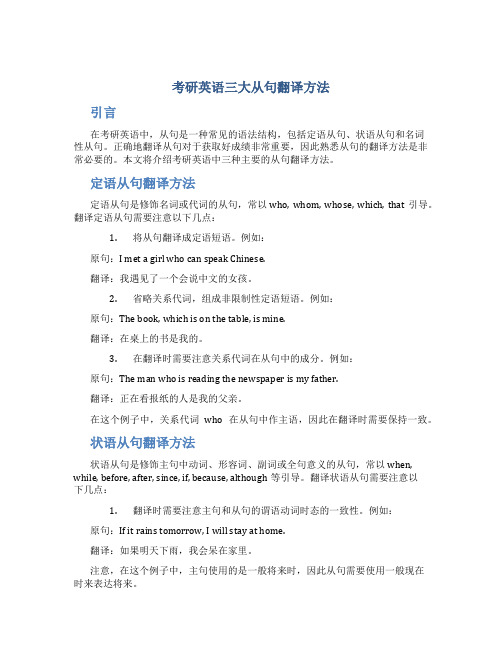
考研英语三大从句翻译方法引言在考研英语中,从句是一种常见的语法结构,包括定语从句、状语从句和名词性从句。
正确地翻译从句对于获取好成绩非常重要,因此熟悉从句的翻译方法是非常必要的。
本文将介绍考研英语中三种主要的从句翻译方法。
定语从句翻译方法定语从句是修饰名词或代词的从句,常以who, whom, whose, which, that引导。
翻译定语从句需要注意以下几点:1.将从句翻译成定语短语。
例如:原句:I met a girl who can speak Chinese.翻译:我遇见了一个会说中文的女孩。
2.省略关系代词,组成非限制性定语短语。
例如:原句:The book, which is on the table, is mine.翻译:在桌上的书是我的。
3.在翻译时需要注意关系代词在从句中的成分。
例如:原句:The man who is reading the newspaper is my father.翻译:正在看报纸的人是我的父亲。
在这个例子中,关系代词who在从句中作主语,因此在翻译时需要保持一致。
状语从句翻译方法状语从句是修饰主句中动词、形容词、副词或全句意义的从句,常以when, while, before, after, since, if, because, although等引导。
翻译状语从句需要注意以下几点:1.翻译时需要注意主句和从句的谓语动词时态的一致性。
例如:原句:If it rains tomorrow, I will stay at home.翻译:如果明天下雨,我会呆在家里。
注意,在这个例子中,主句使用的是一般将来时,因此从句需要使用一般现在时来表达将来。
2.要注意从句中的否定词位置。
例如:原句:Although he is not rich, he is happy.翻译:虽然他不富有,但他很幸福。
3.可以将状语从句翻译成附加状语,放在主句前面或后面。
例如:原句:Before she went to bed, she watched TV.翻译:她看了会儿电视,然后才去睡觉。
三、英译汉基础翻译要点——名词从句的译法

❖ 我们队得了冠军是好消息。
❖2.如主语从句较长,不宜与主句合 译为汉语的“是”字结构,一般可 译为并列分句或独立的句子,即先 译从句,而在主句之前加“这”字 译出。如:
❖ 例1.It is a matter of common experience that bodies are lighter in water than they are in air.
❖例2.That substances expand when heated and contract when cooled is a common physical phenomenon. 物质 热长冷缩是一个普通的物理现象。
例3.What the students find most difficult in a foreign language is its idiomatic usage.学 生感到,一种外语最困难的地方是它的习惯
三、英译汉基础翻译要点
第六章 名词从句的译法
6.1 主语从句
❖ A. 以从属连词或连接代词位于句首的主语从 句翻译时语序一般不变。如:
❖例1.That a man could live for so many years alone in the mountains is really something unthinkable. 一个人 能够单独在山里生活这么多年真是不 可思议。
❖ 可能有人会提出,无线电广播也同样 能够做到这一点;但是在电视屏幕上, 每个节目都显得更加生动,更加真实。
6.2 宾语从句
❖A.以从属连词或连接代词引起的宾 语从句汉译时,语序一般不变。如:
浅谈英语名词性从句的汉译技巧5500字
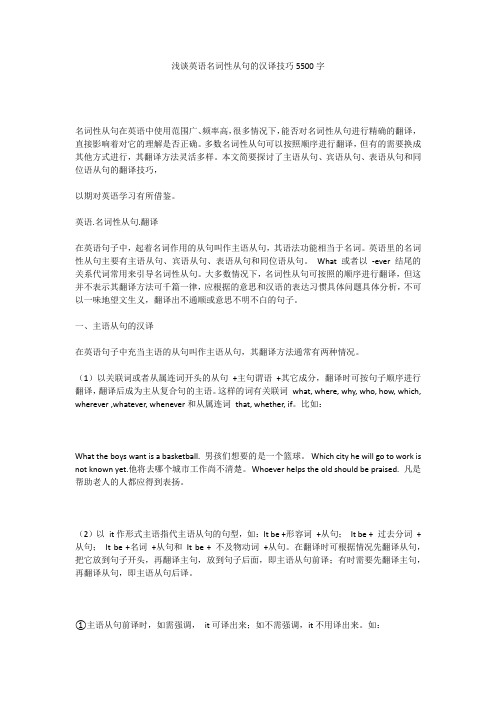
浅谈英语名词性从句的汉译技巧5500字名词性从句在英语中使用范围广、频率高,很多情况下,能否对名词性从句进行精确的翻译,直接影响着对它的理解是否正确。
多数名词性从句可以按照顺序进行翻译,但有的需要换成其他方式进行,其翻译方法灵活多样。
本文简要探讨了主语从句、宾语从句、表语从句和同位语从句的翻译技巧,以期对英语学习有所借鉴。
英语.名词性从句.翻译在英语句子中,起着名词作用的从句叫作主语从句,其语法功能相当于名词。
英语里的名词性从句主要有主语从句、宾语从句、表语从句和同位语从句。
What 或者以-ever结尾的关系代词常用来引导名词性从句。
大多数情况下,名词性从句可按照的顺序进行翻译,但这并不表示其翻译方法可千篇一律,应根据的意思和汉语的表达习惯具体问题具体分析,不可以一味地望文生义,翻译出不通顺或意思不明不白的句子。
一、主语从句的汉译在英语句子中充当主语的从句叫作主语从句,其翻译方法通常有两种情况。
(1)以关联词或者从属连词开头的从句+主句谓语+其它成分,翻译时可按句子顺序进行翻译,翻译后成为主从复合句的主语。
这样的词有关联词what, where, why, who, how, which, wherever ,whatever, whenever和从属连词that, whether, if。
比如:What the boys want is a basketball. 男孩们想要的是一个篮球。
Which city he will go to work is not known yet.他将去哪个城市工作尚不清楚。
Whoever helps the old should be praised. 凡是帮助老人的人都应得到表扬。
(2)以it作形式主语指代主语从句的句型,如:It be +形容词+从句;It be + 过去分词+从句;It be +名词+从句和It be + 不及物动词+从句。
在翻译时可根据情况先翻译从句,把它放到句子开头,再翻译主句,放到句子后面,即主语从句前译;有时需要先翻译主句,再翻译从句,即主语从句后译。
名词从句的译法

名词从句的译法名词从句的译法英语名词从句包括主语从句、宾语从句、表语从句和同位语从句等。
翻译这类从句时,大多数可按原文的句序译成对应的汉语,但也可由一些其它处理方法。
现分述如下。
一、主语从句1.以what, whatever, whoever 等代词引导的主语从句翻译时一般可按原文顺序翻译。
1)What he told me was only half-truth.他告诉我的只是这些半真半假的东西而已。
2)Whatever he saw and heard on his trip gave him a very deep impression.他此行所见所闻都给他留下了深刻的印象。
3)Whoever has made a voyage up the Hudson must remember the Kaatskill Mountains.凡是在哈得逊河上游航行过的人是一定记得卡兹吉尔群山的。
2.以it 作形式主语所引出的真主语从句,翻译时视情况可以提前,也可以不提前。
(1)形式主语从句提前译,为了强调起见,it一般可以译出来,如果不需要强调,it也可以不译出来。
1) It doesn’t make much difference whether he attends the meeting or not.他参加不参加会议没有多大关系。
2) It is a fact that the U. S. S. R. has sent its fleet to all parts of the world.苏联已把它的舰队派往世界各地,这是事实。
3) It seemed inconceivable that the pilot could have survived the crash.驾驶员在飞机坠毁之后,竟然还能活着,这看来是不可想象的。
(2)形式主语从句不提前,it一般不需要译出来。
1) It is strange that she should have failed to see her own shortcomings.真奇怪,她竟然没有看出自己的缺点。
- 1、下载文档前请自行甄别文档内容的完整性,平台不提供额外的编辑、内容补充、找答案等附加服务。
- 2、"仅部分预览"的文档,不可在线预览部分如存在完整性等问题,可反馈申请退款(可完整预览的文档不适用该条件!)。
- 3、如文档侵犯您的权益,请联系客服反馈,我们会尽快为您处理(人工客服工作时间:9:00-18:30)。
例1.It is reported that the meeting will be held in June. 据报导,这个会将在六月间举行. 例2.It is said that there are now three times as many factories in that district as in 1970. 据说,那个地区的工厂比1970年增加 了两倍.
三,英译汉基础翻译要点
第六章 名词从句的译法
6.1 主语从句
A. 以从属连词或连接代词位于句首的主语从 句翻译时语序一般不变.如:
例1.That a man could live for so many years alone in the mountains is really something unthinkable. 一个人 能够单独在山里生活这么多年真是不 可思议. 例2.That substances expand when heated and contract when cooled is a common physical phenomenon. 物质 热长冷缩是一个普通的物理现象.
例3. I leave it to you own judgment whether you should do it. 我让你自己判断你该不该做这事. 汉译英时也可将that引起的宾语从 句提前.如:
例1.I regarded it as an honor that I am chosen to attend the meeting. 我被选参加会议,感到光荣. 例2.We think it true that the election in Britain is mainly a contest between the two big parties, Labor and Conservative. 英国的选举主要是工党与保守党两大政党 之间的竞争,我们认为确实如此.
例4. The idea that for every word in any one language there is another word accurately equivalent to it in every other language, is not in accordance with the facts, in his search for the equivalent of a word the translator meets many difficulties. (Dr. Johnson) 认为一种语言每一个单词都 能在另一种语言中到确切相等的词,是不 符合事实的,译者如追求对号入座式的翻 译,势必到处碰壁.
C. 把同位语从句译成独立的句子, 并在其前加"即",或在从句所修 饰的名词之后加冒号.
例1.We are familiar with the idea that all matter consists of atoms. 我们都熟悉这样一个概念,即一切物质都是由原 子组成的. 例2.Through many years' practice of teaching foreign language, I have derived a new experience that translation is the best possible approach to studying English. 通过多年的外语教学经验,我获得了一条新经验: 翻译是学习英语的最好办法.
B.同位语从句提前,如: 例1.Do away with the mistake metaphysical notions that "gold must be pure" and that "man must be perfect". 要打破"金要足赤","人要完 人"的形而上学的错误思想.
例2.Obviously there was little probability that they would succeed, but they don't mind. 很显然,他们成功的可能性很小,但 是他们不在乎. 例3. This is a universally accepted principle of international law that the territorial sovereignty doesn't admit infringement. 国 家领土主权不容侵犯,这是举世公认的国 际法准则.
例3.He has fully lived up to what he promised. 他完全实现了他的诺 言. 例4.Knowing that every object draws every other object, we cannot know why it does so. 虽然 我们知道物体彼此吸引,但却不知 其中的道理.
பைடு நூலகம்
例3.What the students find most difficult in a foreign language is its idiomatic usage.学 生感到,一种外语最困难的地方是它的习惯 用法. 例4.What struck me most in this book was the author's true-to-life description of the people's life in that country. 这本书给我印象 最深的是作者对那个国家的人民生活所做的 真实的描写. 例5.Whatever was said here must be kept secret. 这里说的每句话都应保密.
B. 英语中的宾语从句有时置于句首, 其修饰作用在于强调宾语.为了使 译文达到相同的修辞效果,翻译时 也宜将宾语从句前置.
例1.Whether they like it or not, I don't care. 他们喜欢不喜欢,我可不管. 例2.What they were asked to do in 10 days, they finished in two. 让他们十天做的事,他们两天就 做完了.
6.3 表语从句 表语从句汉译时的语序一般不变. 如:
例1.Time factor is what we have to take into consideration.时间因素是我 们应考虑的. 例2.The question which worries everyone today is: how long will these fuels last? 今天人人担心的问题是:这 些燃料能维持多久?
2.如主语从句较长,不宜与主句合 译为汉语的"是"字结构,一般可 译为并列分句或独立的句子,即先 译从句,而在主句之前加"这"字 译出.如:
例1.It is a matter of common experience that bodies are lighter in water than they are in air. 物体在水中比在空气中轻,这是一种大家 共有的经验. 例2.It is common sense that a liquid has no definite shape, but it has a definite volume. 液体没有一定的形状,但有一定的体积, 这是普通常识.
B.以形式主语it引出的主语从句, 翻译时有三种处理办法: 1. 如主语从句较短,可提前与主 句合译为"是"字结构.如:
例1. It is dangerous that you have a smattering of superficial knowledge on a subject. 对任何问 题一知半解都是危险的. 例2.It is good news that our team has won the championship. 我们队得了冠军是好消息.
例4.The result of invention of steam engine was that human power was replaced by mechanical power.发明蒸 汽机的结果是机械力代替了人力. 例5.This is because people engaged in changing reality are usually subject to numerous limitations. 这是因为致力变革现实的 人们常常受到许多限制.
但有时在译文中也可依汉语的表达 习惯,把表语从句提前.如: That is why the "know-all" is ridiculous. "知识里手"之所以可笑,原因就在 这个地方.
6.4 同位语从句 英语中的同位语从句与其所修饰的 名词处于同等的地位,只作进一步 解释的作用,汉译时一般用下述方 法处理. A.同位语从句不提前,如:
例1.We expressed the hope that they would come over to visit China again. 我们表示希望他们再到中国来访问. 例2.There can be no doubt that he is qualified for the job. 毫无疑问他做这工作很合适.
例3.What he has once heard be never forgotten. 他听过的话,再也不会忘记
上述译文同样将宾语从句前置,收 到了强调宾语的效果.但有时也可 依汉语的表达习惯将宾语从句后置.
C.用it作形式宾语的句子,汉译时 that引起的宾语从句一般可按原文语 序,it不必译出.
例3.It could be argued that the radio performs this service just as well; but on television everything is much more living, much more real. 可能有人会提出,无线电广播也同样 能够做到这一点;但是在电视屏幕上, 每个节目都显得更加生动,更加真实.
